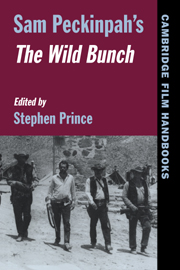Book contents
- Frontmatter
- Contents
- List of Contributors
- Introduction: Sam Peckinpah, Savage Poet of American Cinema
- 1 The Wild Bunch: The Screenplay
- 2 Peckinpah the Radical:The Politics of The Wild Bunch
- 3 “Back Off to What?” Enclosure, Violence, and Capitalism in Sam Peckinpah's The Wild Bunch
- 4 Ballistic Balletics: Styles of Violent Representation in The Wild Bunch and After
- 5 Re-Visioning the Western: Code, Myth, and Genre in Peckinpah's The Wild Bunch
- 6 The Wild Bunch: Innovation and Retreat
- Reviews and Commentary
- Filmography
- Select Bibliography
- Index
6 - The Wild Bunch: Innovation and Retreat
Published online by Cambridge University Press: 29 December 2009
- Frontmatter
- Contents
- List of Contributors
- Introduction: Sam Peckinpah, Savage Poet of American Cinema
- 1 The Wild Bunch: The Screenplay
- 2 Peckinpah the Radical:The Politics of The Wild Bunch
- 3 “Back Off to What?” Enclosure, Violence, and Capitalism in Sam Peckinpah's The Wild Bunch
- 4 Ballistic Balletics: Styles of Violent Representation in The Wild Bunch and After
- 5 Re-Visioning the Western: Code, Myth, and Genre in Peckinpah's The Wild Bunch
- 6 The Wild Bunch: Innovation and Retreat
- Reviews and Commentary
- Filmography
- Select Bibliography
- Index
Summary
To argue that The Wild Bunch is something less than the masterpiece it has been taken for (by some since 1969, by most since its time of reclamation more recently) is not to say that the critical fascination with it is misplaced. The film is too rich to deflect hyperbole for long. In generic terms, Sam Peckinpah's first attempt at Western maudit has a certain edge over most of the commonly sanctioned “classic” Hollywood Westerns, primarily because it comes closer to what we in this deconstructive and unromantic time imagine to have been the real truth of Old Western life: filth and frustration. Additionally, it revels in the bawdy muscularity and brutality that John Ford usually left implied in his hero's sidelong sneer, if at all, and it stripped away many of the tinselly trappings that all those reliable Hollywood hands (Hawks, Mann, their epigones) had draped over the carcass of the genre.
And politically it was the most potent Western since – since when? It came at a time in American history when each drop of movie blood was (probably correctly) felt to be originating from a point somewhere in the vicinity of the Mekong Delta. The film's violence lifted a simple story about what happens when men go to Mexico into the realm of sociocultural comment, enabling the oldest of film schematics, that of the Western, to speak to the most relevant social contingencies. Peckinpah had dismantled a genre and recast it under the heat of modern American history; the artist and his time conspired in creating a work singularly symptomatic of its moment.
- Type
- Chapter
- Information
- Sam Peckinpah's The Wild Bunch , pp. 175 - 200Publisher: Cambridge University PressPrint publication year: 1998
- 1
- Cited by



